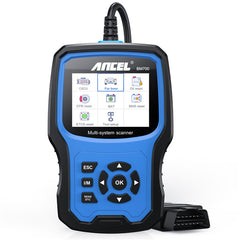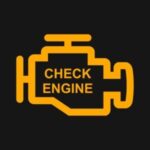The BMW E39, a beacon of automotive engineering, remains a favorite among enthusiasts for its blend of luxury and performance. However, to truly harness and maintain the peak capabilities of your E39, going beyond basic maintenance is crucial. This is where the E39 Obd Scanner becomes an indispensable tool, acting as your gateway to understanding and optimizing your vehicle’s intricate systems. More than just reading error codes, the right OBD scanner unlocks a world of diagnostic potential, enabling you to fine-tune performance enhancements and ensure your E39 operates at its absolute best.
 ANCEL BM700 E39 OBD Scanner: Best car scanner for BMW E39 diagnostics and performance tuning
ANCEL BM700 E39 OBD Scanner: Best car scanner for BMW E39 diagnostics and performance tuning
Engine Tuning and Your E39 OBD Scanner
Engine tuning is a cornerstone of enhancing your BMW E39’s performance. By precisely calibrating the engine management system, you can unlock significant gains in horsepower and torque. This involves adjustments to fuel injection, air intake, and ignition timing, all aimed at optimizing engine efficiency and responsiveness. An e39 obd scanner, such as the ANCEL BM700, plays a vital role in this process. It allows you to monitor real-time engine data, ensuring that tuning adjustments are within safe and optimal parameters. Before and after tuning, an OBD scanner can provide critical insights into engine performance metrics, helping you to validate the effectiveness of your modifications and identify any potential issues. Beyond performance gains, engine tuning, when monitored with an e39 obd scanner, can also contribute to improved fuel economy and reduced emissions, balancing power with environmental consciousness. Whether you seek aggressive throttle response for spirited driving or refined power delivery for daily commutes, your OBD scanner is crucial for tailoring and verifying these engine modifications.
Suspension System Upgrades and OBD Scanner Diagnostics
Enhancing the suspension system is paramount for transforming your BMW E39’s handling dynamics. While the factory suspension is capable, aftermarket upgrades, including stiffer springs, performance shock absorbers, and sway bars, can dramatically improve cornering stability and responsiveness. When undertaking suspension modifications, an e39 obd scanner might not directly interface with suspension components. However, it remains essential for ensuring the overall health of your vehicle during and after these upgrades. By monitoring systems like ABS and stability control (ASC), the OBD scanner can confirm that these safety systems are functioning correctly in conjunction with your new suspension setup. Furthermore, after aggressive driving or track days, your e39 obd scanner can help check for any stress or strain on other vehicle systems resulting from the enhanced suspension, ensuring all components are working harmoniously and safely. A performance suspension not only elevates driving pleasure but, when combined with regular OBD scanner diagnostics, ensures the longevity and reliability of your E39.
Braking System Enhancement and OBD System Checks
For a high-performance BMW E39, an upgraded braking system is non-negotiable. As you increase engine power and handling, ensuring commensurate braking performance is critical for safety. Upgrading to larger brake discs, performance brake pads, and advanced calipers reduces stopping distances and enhances braking consistency. An e39 obd scanner indirectly supports braking system maintenance by monitoring related electronic systems. While it won’t directly read brake pad wear, it can interface with ABS and DSC systems, ensuring these crucial safety features are operating flawlessly after brake system modifications. Regular checks with your e39 obd scanner can also help identify issues that might indirectly affect braking performance, such as wheel speed sensor malfunctions, which are critical for ABS functionality. By ensuring all electronic systems linked to braking are healthy, your OBD scanner contributes to the overall safety and effectiveness of your enhanced braking system, providing confidence during spirited driving and demanding conditions.
Lightweight Components and Vehicle System Monitoring
The pursuit of optimal BMW E39 performance often leads to the adoption of lightweight components. Reducing vehicle mass, through the use of carbon fiber or aluminum for parts like hoods, trunk lids, and wheels, enhances acceleration, handling, and even fuel efficiency. While installing lightweight components is a mechanical process, an e39 obd scanner remains valuable in ensuring the overall health of the vehicle post-modification. Weight reduction can impact various vehicle systems, and your OBD scanner can help monitor for any unintended consequences. For example, lighter wheels can affect wheel speed sensor readings, and your e39 obd scanner can verify these sensors are functioning correctly, ensuring ABS and traction control systems remain accurate and responsive. Furthermore, after weight reduction, monitoring engine and transmission parameters with your e39 obd scanner can help confirm improved efficiency and identify any stress on these systems due to changed vehicle dynamics.
Tire and Wheel Upgrades and Electronic System Compatibility
Upgrading tires and wheels is fundamental to realizing the full potential of your BMW E39. High-performance tires enhance grip, handling, and braking, while lighter wheels improve handling and acceleration. When upgrading wheels and tires, particularly when changing sizes or profiles, an e39 obd scanner becomes useful in ensuring compatibility with your vehicle’s electronic systems. For example, significant changes in tire size can affect speedometer accuracy and ABS/DSC system calibrations. While an OBD scanner might not recalibrate these systems directly, it can read wheel speed sensor data and highlight discrepancies that might indicate a need for further adjustments or coding. By monitoring for error codes related to wheel speed or ABS after tire and wheel upgrades, your e39 obd scanner helps confirm that these modifications haven’t negatively impacted your vehicle’s critical safety systems.
Custom Exhaust Systems and Engine Performance Diagnostics
Customizing your BMW E39’s exhaust system offers performance gains, improved exhaust flow, and a more aggressive sound. Performance exhaust systems reduce backpressure, potentially increasing horsepower and torque. After installing a custom exhaust, an e39 obd scanner is invaluable for verifying its impact on engine performance and ensuring no adverse effects. By monitoring parameters like oxygen sensor readings and fuel trims, your e39 obd scanner can confirm that the new exhaust system is working in harmony with the engine management system and not causing issues like lean or rich running conditions. Furthermore, the OBD scanner can detect any exhaust leaks or catalytic converter inefficiencies that might arise post-installation, ensuring optimal performance and emissions compliance. The enhanced sound of a custom exhaust is a thrill, but the peace of mind provided by e39 obd scanner diagnostics is equally important for maintaining your E39’s long-term health.
Conclusion: The E39 OBD Scanner – Your Partner in Performance
Maximizing your BMW E39’s performance is a journey involving careful upgrades across various systems. From engine tuning to suspension and braking enhancements, each modification contributes to a more potent and engaging driving experience. However, the cornerstone of maintaining these enhancements and ensuring your E39 operates reliably at its peak is the e39 obd scanner. Tools like the ANCEL BM700 are not just for reading fault codes; they are comprehensive diagnostic companions that allow you to monitor your vehicle’s health, validate the effectiveness of your upgrades, and proactively address potential issues. With an e39 obd scanner in your toolkit, you empower yourself to confidently elevate your BMW E39’s performance, knowing you have the insights to keep it running strong for years to come.
FAQs
Q1: How does an E39 OBD scanner help with modifications?
An e39 obd scanner is crucial for verifying that modifications are functioning correctly and are compatible with your BMW E39’s systems. It allows you to monitor performance data and identify potential problems arising from upgrades.
Q2: Can I use an E39 OBD scanner for routine maintenance?
Absolutely. An e39 obd scanner is invaluable for routine maintenance. It can read and clear fault codes, reset service lights, and provide real-time data to help diagnose issues before they escalate, contributing to preventative maintenance.
Q3: Is an E39 OBD scanner necessary for engine tuning?
While not strictly necessary to perform the tune itself, an e39 obd scanner is highly recommended for engine tuning. It allows you to monitor the effects of the tune, ensuring it’s safe and effective, and helps in fine-tuning for optimal performance and efficiency.
Recommended Similar Articles:
Discover the Game-Changing OBD Scanner for BMW Enthusiasts
Regular Maintenance And Precise Diagnostics | ANCEL OBD2 Scanner


